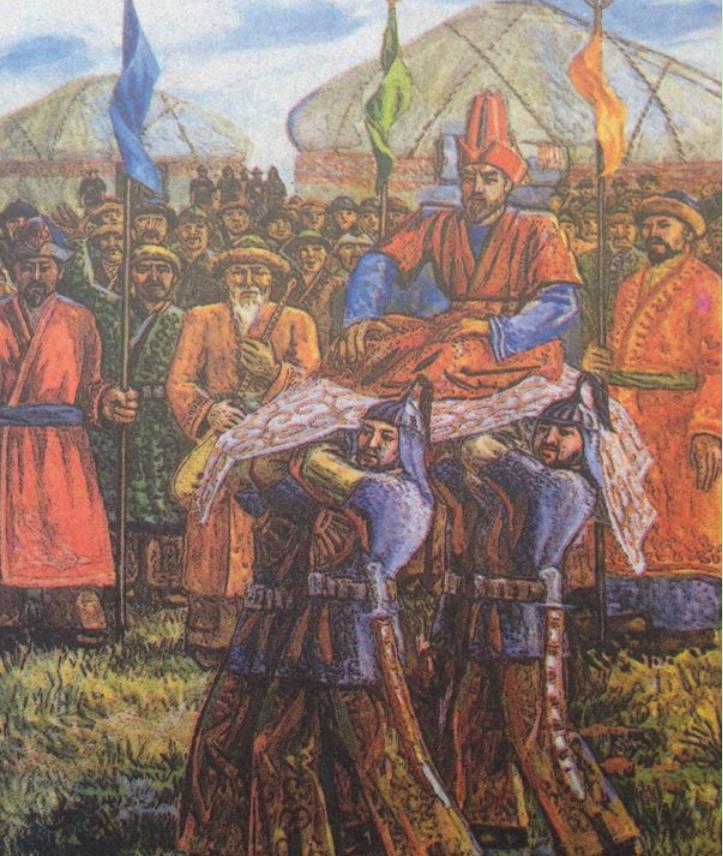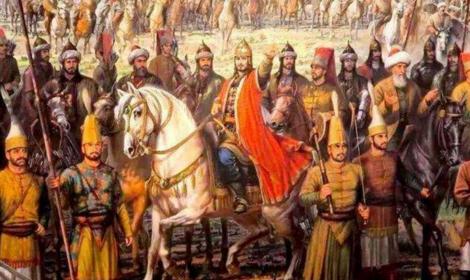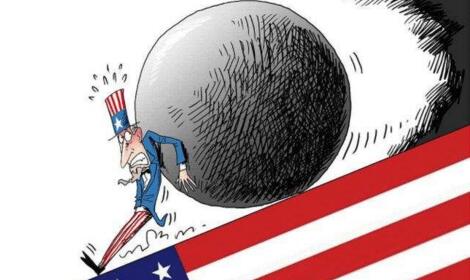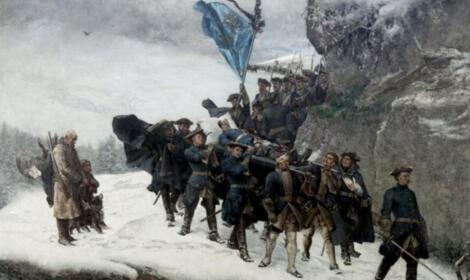是什么导致了蒙古帝国的衰落?
正文翻译

图

图
评论翻译
John J. Luo
The reason is quite simple...
Think of the Mongol Empire as the land version of the Spanish or Portuguese Empire, or even the British Empire. These nations have little to no industrial might before imperialism started and they heavily relied on trade and conquest for materials and goods. The Spanish and Portuguese sought for gold, the British sought rich coastal colonies. The Mongol Empire sought for land; land where people produced an abundance of goods that the not-so technologically advanced mongols could not engineer nor create... but could rather be acquired through conquest.
The Mongol Empire started out as just one small country in Mongolia that gained control over regional tribes. Starting in the heartland on the Mongolian steppes, the tribes of the mongol nation were absorbed and ultimately united under Genghis Khan.
原因很简单......将蒙古帝国看作陆地上的西班牙、葡萄牙、甚至英国帝国。这些国家在帝国主义开始之前几乎没有任何工业实力,严重依赖贸易和征服获得物资和商品。西班牙和葡萄牙寻求黄金,英国寻求富有的沿海殖民地。蒙古帝国寻求土地;那些生产大量商品的土地,对于技术不那么先进的蒙古人来说难以设计或创造......但可以通过征服获得。蒙古帝国最初只是蒙古的一个小国家,在蒙古草原的中心地区控制了地区部落。蒙古国的部落在成吉思汗的带领下逐渐被吸收,并最终统一。
After consolidating power on the steppes, Genghis looked to conquering nearby nations such as Jin to the south, Turkish nations to the west, Xia to the southeast. The conquered were instituted with loyal mongol subjects as head of states. The Mongol Empire then gained control in kingdoms further away in the Middle East, Russian confederates, Eastern European countries, and finally the rich Chinese dynasty in southeast Asia.
All of these nations have specialized trades be it in science, military technology, language and culture, and/or advanced statehood. None were able to march across the lands however and conquer one another because they were able to give and take. The mongols? Well, they didn’t have much the world needed. So they conquered.
在巩固了在大草原上的统治权之后,成吉思汗开始向南方的金国、西方的突厥诸国、东南方的西夏等邻国进军。他们被指派为蒙古属国的首领。然后,蒙古帝国随后控制了更远的中东、俄罗斯联邦、东欧各国,最后控制了东南亚富庶的中国王朝。
这些国家都有各自专业的贸易,无论是在科学、军事技术、语言和文化、还是先进的国家地位方面。然而,他们都无法跨越陆地并互相征服,因为他们能够给予和接受。蒙古人呢?他们没有世界需要的很多东西。因此,他们征服了别人。
Subsequent conquests were ordered directly out of Karakorum
All the conquered nations were instated with loyal Mongol leaders who assimilated to native countries’ cultures. These states are independently ruled but answer directly to the Mongol capital in Karakorum and its leaders, with Khan having the greatest authority, by submitting annual tributes and gifts. They transported to the mongol heartland gold, silver, textile, livestock, children, slaves, and other goods. This “tribute in lieu of conquest” helped the Mongol Empire survive at its core.
Tribute to the Khan and his advisors by guests and subjects
Different tributes were taken from different cultures. For instance, Goryeo was assessed at 10,000 otter skins, 20,000 horses, 10,000 bolts of silk, clothing for 1,000,000 soldiers, and a large number of children and artisans as slaves.
随后的征服是直接从哈拉和林下令的。
征服的国家都安置了忠诚的蒙古领袖,他们融入了本地国家的文化。这些国家是独立统治的,但直接向蒙古的首都哈拉和林以及其领导层,特别是可汗,进行年度的贡品和礼物报告。他们向蒙古本土输送金银、纺织品、牲畜、儿童、奴隶和其他商品。这种“征服代替贡品”的方式帮助蒙古帝国在其核心地带生存下来。
由客人和臣民向可汗和他的顾问致敬的贡品
不同文化的人提交不同的贡品。例如,高丽评估为10,000只水獭皮、20,000匹马、10,000匹丝绸、1,000,000名士兵的服装以及大量儿童和艺术家作为奴隶。
- Expanding the Realm
Inner court of the Khan’s trusted advisors and wives where hidden agendas were in play
Now after a while, these loyal Mongolian rulers who ran the satellite states grew tired and did not want to answer to Mongolia. They were just fine and had enough for themselves, and besides the capital was troubled by constant infighting, political strife, reshuffling of positions in order to gain power for the Khan’s seat, and then there was Kublai Khan...
Kublai is a Khan who was so endeared by the Chinese, that he started his own dynasty called Yuan. China under his rule became rich and prosperous, simultaneously growing in power. Kublai could easily jostle with the ruling Khan in Karakorum who also had other states to worry about. Those states are far away and over time, they gained power and could not be tamed so easily.
- 扩大领土
可汗信任的顾问和妻子的内庭,暗中操纵着议程
现在,这些统治卫星国的忠诚蒙古统治者厌倦了并不想向蒙古报告。他们对自己过得很好,足够了,而且首都常常发生互相争斗、政治纷争、重新调整职位以便夺得可汗宝座的不安,还有忽必烈大汗...
忽必烈是一位深受中国人喜爱的可汗,他成立了自己的朝代——元朝。他的统治下的中国变得富有和繁荣,同时不断壮大。忽必烈可以轻易地与哈拉和林的统治可汗竞争,因为后者也有其他需要担心的国家。那些国家很远,而且随着时间的推移,它们变得越来越强大,不那么容易被驯服。
At the height of its power and influence, the empire covered half of Eurasia
The Mongol Empire began gradually fading because the allegiance forged became stale. Furthermore, Genghis’s descendants carved up major areas for themselves gaining power in their respective states while the empire kept stretching thin by expanding westward.
The different Hordes established by Genghis’s powerful descendants began to loosen their grip on regional power as a result of assimilation and thus we saw the decline over multiple areas beginning in the late 13th century. The Mongols at this point was without a powerful leader that Genghis was luckily able to be: a powerful Khan that brought destruction and new world order.
在其权力和影响达到顶峰时,该帝国覆盖了欧亚大陆的一半
蒙古帝国逐渐消退,因为所建立的忠诚关系变得陈旧。此外,成吉思汗的后代为他们自己的领土划分出了重要地区,而帝国不断向西扩张,变得越来越薄弱。
由成吉思汗强大的后代所建立的不同部落因同化而失去了对地区权力的控制,因此我们看到了13世纪末开始的多个地区的衰落。这时蒙古失去了一个像成吉思汗那样强大的领袖: 一个强大的可汗,给予毁灭和新世界秩序。
Addition: The world was so sure that the mongols could not challenge the Holy Roman Empire because of its sheer size and that it commanded the formidable Legion. However, had the Mongols not been called back eastward, they would have kept divided and conquered Europe until it was too late. The mongols defeated heavy cavalry in Poland and Hungary because the people on horsebacks were so dangerous while mobile. Their speed was a critical advantage and this allowed quick strategy overhaul and battlefield maneuvers.
History has no “ifs”, but if we can speculate that given the power struggle between the Holy Roman Emperor and the Pope, a mongol invasion would have been difficult to defend especially when almost no country in the west kept a constant standing army given its high cost and constant maintenance. The world would perhaps look very different had a battle ensued between these two civilizations.
Thank you for reading.
You can read about my other questions regarding the Mongol Empire.
额外的说明:世界对于蒙古人是否可以挑战神圣罗马帝国毫无疑问,因为它的规模庞大,拥有强大的军队。然而,如果蒙古人没有被召回向东,他们会一直划分和征服欧洲,直到为时已晚。蒙古人在波兰和匈牙利击败了重骑兵,因为骑马的人非常危险,而且活动自如。他们的速度是一个重要的优势,这使得战略调整和战场行动非常快速。
历史上没有“如果”,但是如果我们可以推测,在神圣罗马帝国和教皇之间的权力斗争中,蒙古人的入侵将会很难捍卫,特别是西方几乎没有国家保持常备军,因为成本和不断的维护非常高。如果这两个文明之间爆发战争,那么世界可能会大不相同。
谢谢阅读。
你可以阅读我关于蒙古帝国的其他问题。
Gab Chan
Genghis Khan did not have a successor *
The asterisk is big, and is intentional. When Genghis Khan was still a nobody known as Temüjin, his wife was kidnapped by a rival tribe. She was rescued a few months later. Shortly after that, she gave birth to a boy named Jochi. Genghis Khan declared Jochi to be his own son, and treated Jochi as such. But the doubt lingered. And it would have consequences.
During one kurultai (closed family meeting), 2nd son Chagatai challenged Jochi's legitimacy. Genghis reaffirmed Jochi as his legitimate first son. But fearing future squabbles after his death, he named 3rd son Ögedei as his successor. This basically left no one happy, especially not Jochi, who was rumoured to betray his father, but before anything happened, he died.
Even though the Genghis Khan divided the Empire with his four sons, the question of Jochi's legitimacy would ensure further separation of the Empire. Descendants of Chagatai and Ögedei tend to be allies against the descendants of Jochi in future conflicts.
1241 AD was another important year for the Mongol Empire. It was the year that Chagatai and Ögedei both died. Now, there were two generations of succession is in question, and everyone had an opinion. And everyone was well-armed.
The Mongol Empires further drifted apart as they assimilated with their conquered peoples. Jochi, Chagatai, and Ögedei only had 4000 Mongolian Mongol troops, so their hordes had to raise further troops from locals. Becoming less and less Mongol, there were plenty more shallow reasons to fight each other for the deeper reasons stated before.
成吉思汗没有合法继承者*
这个星号是有意为之的。当成吉思汗还是被称为铁木真时,他的妻子被一个敌对部落绑架了。几个月后,她被救出。不久之后,她生下了一个名叫术赤的男孩。成吉思汗宣称术赤是自己的儿子,并把术赤当做自己的儿子看待。但是这个疑问一直存在。并且它将会产生后果。
在一个忽里勒台(家庭闭门会议)上,第二个儿子察合台质疑术赤的合法性。成吉思汗重申术赤是他的合法长子。但是出于担心他去世后的争斗,他任命第三个儿子窝阔台为自己的继承者。这基本上没有让任何人感到满意,特别是术赤,他被传闻要背叛他的父亲,但在发生任何事情之前,他去世了。
即使成吉思汗把帝国分给了他的四个儿子,术赤的合法性问题仍然会进一步分裂帝国。察合台和窝阔台的后代倾向于在未来的冲突中与术赤的后代结盟。
1241年是蒙古帝国的另一个重要年份。这一年,察合台和窝阔台都去世了。现在,两代人的继承权都存在争议,每个人都有自己的看法。每个人都全副武装。
随着蒙古帝国与其被征服的民族融合,蒙古帝国进一步分裂。术赤、察合台和窝阔台只有4,000名蒙古蒙古军队,因此他们的骑兵必须从当地人中招募更多的士兵。因为变得越来越少,所以存在着更多表面上的原因来为深层次的原因互相争斗。
Paul Mentzer
All “Empires’ have a life story that is very similar, you have the founder generation, lead by the Founder of the Empire, who expands that Empire to its limits. He dies and succeeded by his “Sons“ (I use the term “Sons” in parenthesis for it may NOT be his actual sons but his successors who had worked with the founder while the founder was still alive).
That second Generation works together to maintain the Empire, for it is theirs to share (And they had worked together with the founder and thus see themselves as “One Team”). The problem occurs as the Third Generation moves into power as the Second Generation dies out. The Third Generations are made up of “Cousins” who may or may not like each other but end up fighting among themselves for control. Unlike the Second Generation who, as brothers, tend to avoid killing each other, the third generation have no qualms about killing their “cousins”. The Third Generation also has the habit of diving up the Empire among themselves as each set of “brothers” grab what they can for themselves.
You see this in the Former USSR. While the USSR was founded by Lenin and his followers, it quickly fell into the hands of Stalin who proceeded to kill off the rest of the Revolutionaries and made himself supreme by the late 1930s. Thus Stalin, not Lenin was the founder of the Soviet “Empire”. Stalin needed help to rule and set up a bureaucracy to do so. These Bureaucrats followed Stalin’s Orders, and then found themselves in charge of the USSR when Stalin died in 1952. While Stalin was a blood thirsty tyrant, these “Sons” just wanted to share the Empire and did till they started to die out in the 1980s. In the mid 1980s Gorbachev took over, he was the first leader of the USSR who had NEVER met Stalin, he was thus the first of the third generation, as was Yeltsin. These two and the rest of the Soviet Bureaucrats started to fight over who would control what part of the USSR. The fight ended up in the attempted Coup against Gorbachev, which failed but saw the USSR dissolved. The in fighting between the third generation continued till enough was enough and Putin was picked as a new leader. Putin is a fourth generation from Stalin and in many ways a New First Generation. Such renewal is not unusual in history.
In the case of the Mongols, Genghis Khan was the Founder. he was succeeded by his sons, who ruled as a unit but picked Ogedei Khan as their leader. The Conquest of the Empire continued
所有的“帝国”都有一个非常相似的生命周期。第一代由帝国的创始人领导,他扩张帝国到极限。他死后由他的“儿子们”(我用“儿子们”这个词,因为他的继承人可能不是他的实际儿子,而是曾在他还活着的时候与他一起工作的继承人)继任。
第二代共同努力维护帝国,因为它是他们分享的(并且他们曾与创始人共事,因此认为自己是“一个团队”)。问题出现在第三代接替权力时,因为第二代逐渐消失。
第三代由“堂兄弟”组成,他们可能相互喜欢,但最终会为控制权而互相争斗。与兄弟们往往避免相互残杀不同,第三代对杀害“堂兄弟”毫不犹豫。
第三代还有将帝国分给自己的习惯,由于每组“兄弟”抓住了他们能得到的任何东西。这在前苏联中可以看到。虽然苏联是由列宁和他的追随者创立的,但很快落入斯大林手中,后者在20世纪30年代末成为了至高无上的统治者。
因此,斯大林而不是列宁是苏联“帝国”的创始人。斯大林需要帮助来治理,于是建立了一个官僚机构来做到这一点。这些官僚按照斯大林的命令行事,然后发现当斯大林于1952年去世时,他们掌管着苏联。虽然斯大林是一个嗜血的暴君,但这些“儿子们”只想分享帝国,直到他们在1980年代开始逐渐消失。在1980年代中期,戈尔巴乔夫接收了掌管苏联的权力,他是苏联史上第一个从未见过斯大林的领导人,因此他是第三代中的第一个人,叶利钦也是如此。
这两人和其他苏联官僚开始争夺苏联的控制权。这场争斗以对戈尔巴乔夫的未遂政变结束,但苏联最终解体。第三代之间的内斗继续,直到出现了新领导人普京,他是从斯大林的第四代中挑选出来的,并在很多方面成为一个全新的第一代。这样的更新在历史上并不罕见。关于蒙古人,成吉思汗是创始人,他被他的儿子继承,他们作为团队统治,但选择了拥有领导地位的窝阔台汗。帝国的征服继续进行。
Matthew Sutton
The Mongol Empire was simply too big to administer effectively and didn't originate in the grindingly slow, you might say organic, process that subsumes each and every conquered people completely before moving on. A perfect example of this 'organic' empire would be Rome...which was essentially on a glacial-paced offensive from 500BCE to about 150CE, like the Borg, inexorably subsuming the identity of each conquered people before moving on to the next. Where Rome didn’t completely Romanize the local population (Judaea, Brittania, and perhaps in Basque Country) they still managed to enhance the quality of life and bring order and conditions conducive to long-term economic prosperity—so that these peoples could maybe culturally resent their imperial masters while being somewhat ambivalent about the benefits of being part of the Roman world. The Life of Brian treats this hilariously in the scene where the Judean rebels are trying to rationalize why the Romans are such intolerable masters.
蒙古帝国太大而无法有效地管理,也不是通过一个非常缓慢、有机的过程开始的,该过程会完全吸收每一个征服的人民,并继续前进。一个完美的例子是罗马......从公元前500年到公元150年,基本上是向前推进,像博格人一样不可遏止地吞并每个征服的民族的身份,然后才继续前进。罗马没有完全将当地人民罗马化(犹太,不列颠和巴斯克地区),但他们仍然设法提高生活质量并带来秩序和有利于长期经济繁荣的条件,以便这些民族可能在文化上对其帝国主人怀有怨恨,同时对成为罗马世界的一部分的好处保持相当矛盾的态度。《布莱恩的一生》中的一幕非常幽默地表现了这一点,犹太起义者试图理性地解释为什么罗马人是如此难以忍受的主人。
The staggering success of the Mongols militarily and the subsequent political entropy--all follow the example of central asian steppe empires where nomadic, pastoralists overtake sedentary populations and then find themselves colonized by the stronger cultural influences they are purportedly masters of. The Chinese despite being broken militarily have 4 proud millennia of history to draw from and certainly considered their conquerors coarse barbarians--proud as the Mongols were they themselves must've been somewhat culturally insecure about this: the Qing certainly were. I'd refer to Grousset's Empires of the Steppe for a better treatment than I could possibly give. Yelu Chucai famously said--"an empire conquered on horseback, can't be governed on horseback" which sums it up nicely. The only way the Mongols could become emperors of the Chinese was to become Chinese emperors--and to become emperors of Persia they had to become Persian emperors...and so on.
蒙古人在军事上的惊人成功和随后的政治混乱——都是效仿中亚草原帝国的例子,在那里,游牧民族取代了定居的人口,然后发现自己被更强大的文化影响所殖民,他们据称是主人。尽管中国在军事上被打败了,但他们有4000年的历史可以借鉴,当然认为他们的征服者是粗鲁的野蛮人——尽管蒙古人很骄傲,但他们自己一定在文化上对此有点不安全:清朝当然是。我想参考格鲁塞的《草原帝国》,以获得比我能给出的更好的解释。耶律楚材有句名言:“战于马背,治于马背”,这句话很好地概括了这一点。蒙古人要成为中国人的皇帝,唯一的办法就是成为中国的皇帝——而要成为波斯人的皇帝,他们必须成为波斯的皇帝……等等......
Each of these cultural regions had existing templates for political administration that the Mongols simply had no better alternative to--although if establishing a long lasting Empire was their intent then erasing the original machinery and committing all conquered territories to a homogenous system of their own would have been the obvious way to go. Could the Mongols have completely replaced all the preexisting Kievan, Novgorodian, Sogdian, Kashgari, Song, Persian, Korean, etc
这些文化区域中的每一个都有其政治管理的现有模板,而蒙古人则没有更好的选择——尽管如果他们的目标是建立一个持久的帝国,那么抹去原来的机制,将所有征服的领土承诺给一个自己的同质化系统,是显而易见的选择。蒙古人能够完全取代所有现有的基辅、诺夫哥罗德、苏格底亚、喀什格尔、宋朝、波斯、韩国等法律、
laws, trade policies, taxation and tariff collections, military conscxtion arrangements with a new Mongolian one? I guess it’s possible theoretically but the Mongolians a generation before Temujin were squabbling pastoral nomads constantly engaged in bitter blood feuds over stolen maidens and sheep, living in gers, and struggling to eke out a subsistence existence in very harsh environmental conditions.
贸易政策、税收和关税征收、军事征兵安排等等,使用全新的蒙古法律?我想在理论上可能是可能的,但在成吉思汗之前的一代蒙古人是争斗不断的游牧民族,经常就因被偷走的姑娘和绵羊而陷入激烈的血争,生活在蒙古包里,在非常恶劣的环境条件下挣扎着谋求生计。
The Mongols didn’t have centuries of well-developed jurisprudence, economic theory, etc to draw from in administering their vast conquests and it’s only natural they relied on local administrators to run the show mostly as they traditionally had for them. The Mongols did create a stable enough order for a century or so across Eurasia to allow long-distance trade to flourish—but their policies at the local and regional level were (as pointed out elsewhere) mostly parasitic and exploitive. Their main goal wasn’t too enhance their subject peoples’ living conditions, to integrate the various peoples into one cultural/economic/political super-entity, and to Mongolize the local population and demonstrate the superiority of Mongolian ways of doing things. They were mostly concerned about establishing dominance, instilling fear, and enriching themselves off the backs of their subjects—and that’s obviously not a sustainable arrangement when you are a tiny minority reliant on your subjects to administer everything for you.
蒙古人没有几个世纪的成熟法律学说、经济理论等方面的积累来管理他们广泛的征服,他们往往依赖于当地的行政官员来运营整个地区。蒙古人的主要目标是在欧亚大陆上建立稳定的秩序,允许远距离贸易繁荣,但他们在地方和区域层面上的政策大多是寄生和剥削性的,他们的主要关注点并不是提高被统治民族的生活条件,而是集权、灌输恐惧和从他们的臣民中获取利润,这显然不是一种可持续的安排,特别是当你是依赖于你的臣民来为你运营一切的少数派时
The Mongol's own tradition of dividing up the spoils amongst family members left the Empire really an association of sub-Empire's, each with it's own cultural 'centers of gravity', and their own staggering array of conquered creeds and tongues to integrate. These Khanates were naturally consolidated by their often mutually distrustful leaders at the expense of systemic pan-Mongolian cooperation--and quickly reverted to their own characteristic identities.
蒙古人分赃给家庭成员的传统让帝国成为了一个协会式的次帝国,每个帝国都有其自己的文化重心和征服的信仰和语言。这些可汗国很自然地被它们经常相互不信任的领导人合并,以牺牲系统性的整体蒙古合作为代价,并迅速恢复到它们自己的特征身份。
The Golden Khanate became very Turkish, the Il-Khanate very Persian, the Yuan very Chinese. I was about to mention the immediate fragmentation of the Carolingian empire due to division amongst family, but a better analogue might be the immediate dissolution of the quickly conquered Alexandrian empire into Seleucid, Ptolemaic, Attalid, and Antigonid domains--each of which had a pre-existing cultural and economic cohesiveness, or 'logic', that the vast patchwork of Alexander’s military conquests taken as a whole did not. Sogdians and Egyptians and Indus Valley kingdoms generally didn’t see each other as compatriots under a Greco-Persian overlord.
Like these Hellenistic kingdoms, the Mongol Khanates themselves had much more longevity than the original empire. Each Khanate corresponded with a preexisting “proto-national” cultural identity and economic region.
One way to think about it might be how implausible it would be that muslim Arabs would immediately identify as subjects of a Chinese emperor, or Koreans to a Persian one, or Vietnamese to a Lithuanian one. It's sort of historically far-fetched as these peoples in the 13-cent had relatively little direct contact with one another before they became fellow subjects.
金帐汗国变得非常土耳其,伊利汗国变得非常波斯,元朝变得非常中国。我正要提到加洛林帝国因家族分裂而立即分裂,但更贴切的类比可能是迅速被征服的亚历山大帝国立即分裂为塞琉古、托勒密、阿塔利德和安提柯帝国——每个帝国都有一个预先存在的文化和经济凝聚力,或“逻辑”,而亚历山大的大量军事征服作为一个整体却没有。粟特人、埃及人和印度河流域的王国通常不把对方视为希腊波斯霸主的同胞。
像这些希腊化的王国一样,蒙古汗国本身也比原来的帝国长寿得多。每个汗国都与一个预先存在的“原民族”文化认同和经济区域相对应。
一种思考方式可能是,穆斯林阿拉伯人会立即认同为中国皇帝的臣民,或者朝鲜人认同为波斯皇帝的臣民,或者越南人认同为立陶宛皇帝的臣民,这是多么难以置信。这在历史上有点牵强,因为13世纪的这些民族在成为同胞之前彼此之间的直接接触相对较少。
Even bitterly hostile neighbors generally share a common cultural history through their interaction with one another: think Pakistan and India, Greece and Turkey, Ireland and the British Empire, etc etc. While these are distinct people with proud traditions of their own--they've interacted throughout the ages. The idea that an Irishman or Norman or Scotsman might be governed or governing and Englishman doesn’t seem too crazy based on centuries of historical interaction. But the idea that a Korean tax collector would be brought into collect taxes in Persia certainly would be weird and unnatural. Certainly the Han Chinese were alienated by the Mongol’s preference for using outside help for oversight of local functionaries to try and break up potential conspiracies fomenting at a local level. Marco Polo, a Venetian trader, being given a government post by Kublai Khan, is one such example of this. Do you think the local Mandarin speaking population and government officials really saw Marco Polo as a legitimate servant of the people of the Empire…or a just a mercenary foreigner meant to keep an eye on things for the Mongol overlords?
即使是憎恶对方的邻国通常也通过彼此的交往共享共同的文化历史:例如巴基斯坦和印度、希腊和土耳其、爱尔兰和大英帝国等等。虽然这些是具有自豪传统的不同群体,但它们已经相互作用多年。在这种情况下,一个爱尔兰人、诺曼人或苏格兰人被控制或统治英格兰人似乎并不太荒谬,因为他们已经在历史上相互作用了。但韩国的税务人员被带到波斯收税的想法肯定会很奇怪和不自然。当然,汉族人对蒙古人喜欢使用外部支持来监督当地官员以瓦解在地方层面上蕴藏的潜在阴谋感到疏远。马可波罗是一位威尼斯商人,被忽必烈委派为政府官员,这就是这种情况的一个例子。你认为当地说普通话的人口和政府官员真的把马可波罗视为帝国人民的合法仆人……还是只是一个雇佣的外国人,旨在为蒙古统治者监视事情?
For regional population centers to conquer its less-settled neighbors and in turn be subjugated by the barbarians on the periphery is the dance of history. For an empire to include lots of formerly Imperial centers is another thing entirely.
You might call the Mongol empire a 'meta-empire' or a confederation of empires. The Inca would probably fit this bill too, which helps explain how fragile their recently established empire was.
地区人口中心征服其不那么稳定的邻居,而后被外围的野蛮人所征服,这是历史舞台上的循环。但如果一个帝国包含了许多曾经的帝国中心,那就完全不同了。你可以把蒙古帝国称为“超级帝国”或帝国联盟。印加帝国也可能符合这个特点,这有助于解释他们最近建立的帝国是多么脆弱。
If Genghis Khan had left the whole empire to a long line of forceful and efficient civil administrators who were committed to working together towards establishing Mongolian hegemony over Eurasia who knows how well it may have congealed over time. But they didn’t. And maybe this is where we can blame the booze. Can you imagine what might have happened if the Mongols implemented the Chinese imperial examination system over all of their conquests, subverted military power to civil authority, and allowed the Great Khanates and it’s advisors be a rotating term limited post awarded to the most capable men to come through all of Eurasia? That would’ve been transformative. But the Mongols weren’t that far-sighted, and depended on local status quo mostly. Perhaps we'd all be living in the pax Mongolica and speaking the lingua Mongolia to this day.
如果成吉思汗把整个帝国留给一系列有力而高效的文职行政官员,他们致力于共同建立蒙古在整个欧亚大陆的霸权,谁知道它会在长时间内多么好地凝聚起来?但是他们没有这样做。也许这就是我们可以责怪酒精的地方。你可以想象如果蒙古人在所有征服地区实行了中国的科举制度,将军事力量屈服于文官权力,并允许大可汗和他的顾问担任旋转任期有限的职务,颁发给通过欧亚大陆的最有能力的人会发生什么事。那将是具有变革性的。但是蒙古人不是那么有远见,他们大多依靠当地的现状。也许我们现在都会生活在蒙古的和平下,并说着蒙古语。
The reason is quite simple...
Think of the Mongol Empire as the land version of the Spanish or Portuguese Empire, or even the British Empire. These nations have little to no industrial might before imperialism started and they heavily relied on trade and conquest for materials and goods. The Spanish and Portuguese sought for gold, the British sought rich coastal colonies. The Mongol Empire sought for land; land where people produced an abundance of goods that the not-so technologically advanced mongols could not engineer nor create... but could rather be acquired through conquest.
The Mongol Empire started out as just one small country in Mongolia that gained control over regional tribes. Starting in the heartland on the Mongolian steppes, the tribes of the mongol nation were absorbed and ultimately united under Genghis Khan.
原因很简单......将蒙古帝国看作陆地上的西班牙、葡萄牙、甚至英国帝国。这些国家在帝国主义开始之前几乎没有任何工业实力,严重依赖贸易和征服获得物资和商品。西班牙和葡萄牙寻求黄金,英国寻求富有的沿海殖民地。蒙古帝国寻求土地;那些生产大量商品的土地,对于技术不那么先进的蒙古人来说难以设计或创造......但可以通过征服获得。蒙古帝国最初只是蒙古的一个小国家,在蒙古草原的中心地区控制了地区部落。蒙古国的部落在成吉思汗的带领下逐渐被吸收,并最终统一。
After consolidating power on the steppes, Genghis looked to conquering nearby nations such as Jin to the south, Turkish nations to the west, Xia to the southeast. The conquered were instituted with loyal mongol subjects as head of states. The Mongol Empire then gained control in kingdoms further away in the Middle East, Russian confederates, Eastern European countries, and finally the rich Chinese dynasty in southeast Asia.
All of these nations have specialized trades be it in science, military technology, language and culture, and/or advanced statehood. None were able to march across the lands however and conquer one another because they were able to give and take. The mongols? Well, they didn’t have much the world needed. So they conquered.
在巩固了在大草原上的统治权之后,成吉思汗开始向南方的金国、西方的突厥诸国、东南方的西夏等邻国进军。他们被指派为蒙古属国的首领。然后,蒙古帝国随后控制了更远的中东、俄罗斯联邦、东欧各国,最后控制了东南亚富庶的中国王朝。
这些国家都有各自专业的贸易,无论是在科学、军事技术、语言和文化、还是先进的国家地位方面。然而,他们都无法跨越陆地并互相征服,因为他们能够给予和接受。蒙古人呢?他们没有世界需要的很多东西。因此,他们征服了别人。
Subsequent conquests were ordered directly out of Karakorum
All the conquered nations were instated with loyal Mongol leaders who assimilated to native countries’ cultures. These states are independently ruled but answer directly to the Mongol capital in Karakorum and its leaders, with Khan having the greatest authority, by submitting annual tributes and gifts. They transported to the mongol heartland gold, silver, textile, livestock, children, slaves, and other goods. This “tribute in lieu of conquest” helped the Mongol Empire survive at its core.
Tribute to the Khan and his advisors by guests and subjects
Different tributes were taken from different cultures. For instance, Goryeo was assessed at 10,000 otter skins, 20,000 horses, 10,000 bolts of silk, clothing for 1,000,000 soldiers, and a large number of children and artisans as slaves.
随后的征服是直接从哈拉和林下令的。
征服的国家都安置了忠诚的蒙古领袖,他们融入了本地国家的文化。这些国家是独立统治的,但直接向蒙古的首都哈拉和林以及其领导层,特别是可汗,进行年度的贡品和礼物报告。他们向蒙古本土输送金银、纺织品、牲畜、儿童、奴隶和其他商品。这种“征服代替贡品”的方式帮助蒙古帝国在其核心地带生存下来。
由客人和臣民向可汗和他的顾问致敬的贡品
不同文化的人提交不同的贡品。例如,高丽评估为10,000只水獭皮、20,000匹马、10,000匹丝绸、1,000,000名士兵的服装以及大量儿童和艺术家作为奴隶。
- Expanding the Realm
Inner court of the Khan’s trusted advisors and wives where hidden agendas were in play
Now after a while, these loyal Mongolian rulers who ran the satellite states grew tired and did not want to answer to Mongolia. They were just fine and had enough for themselves, and besides the capital was troubled by constant infighting, political strife, reshuffling of positions in order to gain power for the Khan’s seat, and then there was Kublai Khan...
Kublai is a Khan who was so endeared by the Chinese, that he started his own dynasty called Yuan. China under his rule became rich and prosperous, simultaneously growing in power. Kublai could easily jostle with the ruling Khan in Karakorum who also had other states to worry about. Those states are far away and over time, they gained power and could not be tamed so easily.
- 扩大领土
可汗信任的顾问和妻子的内庭,暗中操纵着议程
现在,这些统治卫星国的忠诚蒙古统治者厌倦了并不想向蒙古报告。他们对自己过得很好,足够了,而且首都常常发生互相争斗、政治纷争、重新调整职位以便夺得可汗宝座的不安,还有忽必烈大汗...
忽必烈是一位深受中国人喜爱的可汗,他成立了自己的朝代——元朝。他的统治下的中国变得富有和繁荣,同时不断壮大。忽必烈可以轻易地与哈拉和林的统治可汗竞争,因为后者也有其他需要担心的国家。那些国家很远,而且随着时间的推移,它们变得越来越强大,不那么容易被驯服。
At the height of its power and influence, the empire covered half of Eurasia
The Mongol Empire began gradually fading because the allegiance forged became stale. Furthermore, Genghis’s descendants carved up major areas for themselves gaining power in their respective states while the empire kept stretching thin by expanding westward.
The different Hordes established by Genghis’s powerful descendants began to loosen their grip on regional power as a result of assimilation and thus we saw the decline over multiple areas beginning in the late 13th century. The Mongols at this point was without a powerful leader that Genghis was luckily able to be: a powerful Khan that brought destruction and new world order.
在其权力和影响达到顶峰时,该帝国覆盖了欧亚大陆的一半
蒙古帝国逐渐消退,因为所建立的忠诚关系变得陈旧。此外,成吉思汗的后代为他们自己的领土划分出了重要地区,而帝国不断向西扩张,变得越来越薄弱。
由成吉思汗强大的后代所建立的不同部落因同化而失去了对地区权力的控制,因此我们看到了13世纪末开始的多个地区的衰落。这时蒙古失去了一个像成吉思汗那样强大的领袖: 一个强大的可汗,给予毁灭和新世界秩序。
Addition: The world was so sure that the mongols could not challenge the Holy Roman Empire because of its sheer size and that it commanded the formidable Legion. However, had the Mongols not been called back eastward, they would have kept divided and conquered Europe until it was too late. The mongols defeated heavy cavalry in Poland and Hungary because the people on horsebacks were so dangerous while mobile. Their speed was a critical advantage and this allowed quick strategy overhaul and battlefield maneuvers.
History has no “ifs”, but if we can speculate that given the power struggle between the Holy Roman Emperor and the Pope, a mongol invasion would have been difficult to defend especially when almost no country in the west kept a constant standing army given its high cost and constant maintenance. The world would perhaps look very different had a battle ensued between these two civilizations.
Thank you for reading.
You can read about my other questions regarding the Mongol Empire.
额外的说明:世界对于蒙古人是否可以挑战神圣罗马帝国毫无疑问,因为它的规模庞大,拥有强大的军队。然而,如果蒙古人没有被召回向东,他们会一直划分和征服欧洲,直到为时已晚。蒙古人在波兰和匈牙利击败了重骑兵,因为骑马的人非常危险,而且活动自如。他们的速度是一个重要的优势,这使得战略调整和战场行动非常快速。
历史上没有“如果”,但是如果我们可以推测,在神圣罗马帝国和教皇之间的权力斗争中,蒙古人的入侵将会很难捍卫,特别是西方几乎没有国家保持常备军,因为成本和不断的维护非常高。如果这两个文明之间爆发战争,那么世界可能会大不相同。
谢谢阅读。
你可以阅读我关于蒙古帝国的其他问题。
Gab Chan
Genghis Khan did not have a successor *
The asterisk is big, and is intentional. When Genghis Khan was still a nobody known as Temüjin, his wife was kidnapped by a rival tribe. She was rescued a few months later. Shortly after that, she gave birth to a boy named Jochi. Genghis Khan declared Jochi to be his own son, and treated Jochi as such. But the doubt lingered. And it would have consequences.
During one kurultai (closed family meeting), 2nd son Chagatai challenged Jochi's legitimacy. Genghis reaffirmed Jochi as his legitimate first son. But fearing future squabbles after his death, he named 3rd son Ögedei as his successor. This basically left no one happy, especially not Jochi, who was rumoured to betray his father, but before anything happened, he died.
Even though the Genghis Khan divided the Empire with his four sons, the question of Jochi's legitimacy would ensure further separation of the Empire. Descendants of Chagatai and Ögedei tend to be allies against the descendants of Jochi in future conflicts.
1241 AD was another important year for the Mongol Empire. It was the year that Chagatai and Ögedei both died. Now, there were two generations of succession is in question, and everyone had an opinion. And everyone was well-armed.
The Mongol Empires further drifted apart as they assimilated with their conquered peoples. Jochi, Chagatai, and Ögedei only had 4000 Mongolian Mongol troops, so their hordes had to raise further troops from locals. Becoming less and less Mongol, there were plenty more shallow reasons to fight each other for the deeper reasons stated before.
成吉思汗没有合法继承者*
这个星号是有意为之的。当成吉思汗还是被称为铁木真时,他的妻子被一个敌对部落绑架了。几个月后,她被救出。不久之后,她生下了一个名叫术赤的男孩。成吉思汗宣称术赤是自己的儿子,并把术赤当做自己的儿子看待。但是这个疑问一直存在。并且它将会产生后果。
在一个忽里勒台(家庭闭门会议)上,第二个儿子察合台质疑术赤的合法性。成吉思汗重申术赤是他的合法长子。但是出于担心他去世后的争斗,他任命第三个儿子窝阔台为自己的继承者。这基本上没有让任何人感到满意,特别是术赤,他被传闻要背叛他的父亲,但在发生任何事情之前,他去世了。
即使成吉思汗把帝国分给了他的四个儿子,术赤的合法性问题仍然会进一步分裂帝国。察合台和窝阔台的后代倾向于在未来的冲突中与术赤的后代结盟。
1241年是蒙古帝国的另一个重要年份。这一年,察合台和窝阔台都去世了。现在,两代人的继承权都存在争议,每个人都有自己的看法。每个人都全副武装。
随着蒙古帝国与其被征服的民族融合,蒙古帝国进一步分裂。术赤、察合台和窝阔台只有4,000名蒙古蒙古军队,因此他们的骑兵必须从当地人中招募更多的士兵。因为变得越来越少,所以存在着更多表面上的原因来为深层次的原因互相争斗。
Paul Mentzer
All “Empires’ have a life story that is very similar, you have the founder generation, lead by the Founder of the Empire, who expands that Empire to its limits. He dies and succeeded by his “Sons“ (I use the term “Sons” in parenthesis for it may NOT be his actual sons but his successors who had worked with the founder while the founder was still alive).
That second Generation works together to maintain the Empire, for it is theirs to share (And they had worked together with the founder and thus see themselves as “One Team”). The problem occurs as the Third Generation moves into power as the Second Generation dies out. The Third Generations are made up of “Cousins” who may or may not like each other but end up fighting among themselves for control. Unlike the Second Generation who, as brothers, tend to avoid killing each other, the third generation have no qualms about killing their “cousins”. The Third Generation also has the habit of diving up the Empire among themselves as each set of “brothers” grab what they can for themselves.
You see this in the Former USSR. While the USSR was founded by Lenin and his followers, it quickly fell into the hands of Stalin who proceeded to kill off the rest of the Revolutionaries and made himself supreme by the late 1930s. Thus Stalin, not Lenin was the founder of the Soviet “Empire”. Stalin needed help to rule and set up a bureaucracy to do so. These Bureaucrats followed Stalin’s Orders, and then found themselves in charge of the USSR when Stalin died in 1952. While Stalin was a blood thirsty tyrant, these “Sons” just wanted to share the Empire and did till they started to die out in the 1980s. In the mid 1980s Gorbachev took over, he was the first leader of the USSR who had NEVER met Stalin, he was thus the first of the third generation, as was Yeltsin. These two and the rest of the Soviet Bureaucrats started to fight over who would control what part of the USSR. The fight ended up in the attempted Coup against Gorbachev, which failed but saw the USSR dissolved. The in fighting between the third generation continued till enough was enough and Putin was picked as a new leader. Putin is a fourth generation from Stalin and in many ways a New First Generation. Such renewal is not unusual in history.
In the case of the Mongols, Genghis Khan was the Founder. he was succeeded by his sons, who ruled as a unit but picked Ogedei Khan as their leader. The Conquest of the Empire continued
所有的“帝国”都有一个非常相似的生命周期。第一代由帝国的创始人领导,他扩张帝国到极限。他死后由他的“儿子们”(我用“儿子们”这个词,因为他的继承人可能不是他的实际儿子,而是曾在他还活着的时候与他一起工作的继承人)继任。
第二代共同努力维护帝国,因为它是他们分享的(并且他们曾与创始人共事,因此认为自己是“一个团队”)。问题出现在第三代接替权力时,因为第二代逐渐消失。
第三代由“堂兄弟”组成,他们可能相互喜欢,但最终会为控制权而互相争斗。与兄弟们往往避免相互残杀不同,第三代对杀害“堂兄弟”毫不犹豫。
第三代还有将帝国分给自己的习惯,由于每组“兄弟”抓住了他们能得到的任何东西。这在前苏联中可以看到。虽然苏联是由列宁和他的追随者创立的,但很快落入斯大林手中,后者在20世纪30年代末成为了至高无上的统治者。
因此,斯大林而不是列宁是苏联“帝国”的创始人。斯大林需要帮助来治理,于是建立了一个官僚机构来做到这一点。这些官僚按照斯大林的命令行事,然后发现当斯大林于1952年去世时,他们掌管着苏联。虽然斯大林是一个嗜血的暴君,但这些“儿子们”只想分享帝国,直到他们在1980年代开始逐渐消失。在1980年代中期,戈尔巴乔夫接收了掌管苏联的权力,他是苏联史上第一个从未见过斯大林的领导人,因此他是第三代中的第一个人,叶利钦也是如此。
这两人和其他苏联官僚开始争夺苏联的控制权。这场争斗以对戈尔巴乔夫的未遂政变结束,但苏联最终解体。第三代之间的内斗继续,直到出现了新领导人普京,他是从斯大林的第四代中挑选出来的,并在很多方面成为一个全新的第一代。这样的更新在历史上并不罕见。关于蒙古人,成吉思汗是创始人,他被他的儿子继承,他们作为团队统治,但选择了拥有领导地位的窝阔台汗。帝国的征服继续进行。
Matthew Sutton
The Mongol Empire was simply too big to administer effectively and didn't originate in the grindingly slow, you might say organic, process that subsumes each and every conquered people completely before moving on. A perfect example of this 'organic' empire would be Rome...which was essentially on a glacial-paced offensive from 500BCE to about 150CE, like the Borg, inexorably subsuming the identity of each conquered people before moving on to the next. Where Rome didn’t completely Romanize the local population (Judaea, Brittania, and perhaps in Basque Country) they still managed to enhance the quality of life and bring order and conditions conducive to long-term economic prosperity—so that these peoples could maybe culturally resent their imperial masters while being somewhat ambivalent about the benefits of being part of the Roman world. The Life of Brian treats this hilariously in the scene where the Judean rebels are trying to rationalize why the Romans are such intolerable masters.
蒙古帝国太大而无法有效地管理,也不是通过一个非常缓慢、有机的过程开始的,该过程会完全吸收每一个征服的人民,并继续前进。一个完美的例子是罗马......从公元前500年到公元150年,基本上是向前推进,像博格人一样不可遏止地吞并每个征服的民族的身份,然后才继续前进。罗马没有完全将当地人民罗马化(犹太,不列颠和巴斯克地区),但他们仍然设法提高生活质量并带来秩序和有利于长期经济繁荣的条件,以便这些民族可能在文化上对其帝国主人怀有怨恨,同时对成为罗马世界的一部分的好处保持相当矛盾的态度。《布莱恩的一生》中的一幕非常幽默地表现了这一点,犹太起义者试图理性地解释为什么罗马人是如此难以忍受的主人。
The staggering success of the Mongols militarily and the subsequent political entropy--all follow the example of central asian steppe empires where nomadic, pastoralists overtake sedentary populations and then find themselves colonized by the stronger cultural influences they are purportedly masters of. The Chinese despite being broken militarily have 4 proud millennia of history to draw from and certainly considered their conquerors coarse barbarians--proud as the Mongols were they themselves must've been somewhat culturally insecure about this: the Qing certainly were. I'd refer to Grousset's Empires of the Steppe for a better treatment than I could possibly give. Yelu Chucai famously said--"an empire conquered on horseback, can't be governed on horseback" which sums it up nicely. The only way the Mongols could become emperors of the Chinese was to become Chinese emperors--and to become emperors of Persia they had to become Persian emperors...and so on.
蒙古人在军事上的惊人成功和随后的政治混乱——都是效仿中亚草原帝国的例子,在那里,游牧民族取代了定居的人口,然后发现自己被更强大的文化影响所殖民,他们据称是主人。尽管中国在军事上被打败了,但他们有4000年的历史可以借鉴,当然认为他们的征服者是粗鲁的野蛮人——尽管蒙古人很骄傲,但他们自己一定在文化上对此有点不安全:清朝当然是。我想参考格鲁塞的《草原帝国》,以获得比我能给出的更好的解释。耶律楚材有句名言:“战于马背,治于马背”,这句话很好地概括了这一点。蒙古人要成为中国人的皇帝,唯一的办法就是成为中国的皇帝——而要成为波斯人的皇帝,他们必须成为波斯的皇帝……等等......
Each of these cultural regions had existing templates for political administration that the Mongols simply had no better alternative to--although if establishing a long lasting Empire was their intent then erasing the original machinery and committing all conquered territories to a homogenous system of their own would have been the obvious way to go. Could the Mongols have completely replaced all the preexisting Kievan, Novgorodian, Sogdian, Kashgari, Song, Persian, Korean, etc
这些文化区域中的每一个都有其政治管理的现有模板,而蒙古人则没有更好的选择——尽管如果他们的目标是建立一个持久的帝国,那么抹去原来的机制,将所有征服的领土承诺给一个自己的同质化系统,是显而易见的选择。蒙古人能够完全取代所有现有的基辅、诺夫哥罗德、苏格底亚、喀什格尔、宋朝、波斯、韩国等法律、
laws, trade policies, taxation and tariff collections, military conscxtion arrangements with a new Mongolian one? I guess it’s possible theoretically but the Mongolians a generation before Temujin were squabbling pastoral nomads constantly engaged in bitter blood feuds over stolen maidens and sheep, living in gers, and struggling to eke out a subsistence existence in very harsh environmental conditions.
贸易政策、税收和关税征收、军事征兵安排等等,使用全新的蒙古法律?我想在理论上可能是可能的,但在成吉思汗之前的一代蒙古人是争斗不断的游牧民族,经常就因被偷走的姑娘和绵羊而陷入激烈的血争,生活在蒙古包里,在非常恶劣的环境条件下挣扎着谋求生计。
The Mongols didn’t have centuries of well-developed jurisprudence, economic theory, etc to draw from in administering their vast conquests and it’s only natural they relied on local administrators to run the show mostly as they traditionally had for them. The Mongols did create a stable enough order for a century or so across Eurasia to allow long-distance trade to flourish—but their policies at the local and regional level were (as pointed out elsewhere) mostly parasitic and exploitive. Their main goal wasn’t too enhance their subject peoples’ living conditions, to integrate the various peoples into one cultural/economic/political super-entity, and to Mongolize the local population and demonstrate the superiority of Mongolian ways of doing things. They were mostly concerned about establishing dominance, instilling fear, and enriching themselves off the backs of their subjects—and that’s obviously not a sustainable arrangement when you are a tiny minority reliant on your subjects to administer everything for you.
蒙古人没有几个世纪的成熟法律学说、经济理论等方面的积累来管理他们广泛的征服,他们往往依赖于当地的行政官员来运营整个地区。蒙古人的主要目标是在欧亚大陆上建立稳定的秩序,允许远距离贸易繁荣,但他们在地方和区域层面上的政策大多是寄生和剥削性的,他们的主要关注点并不是提高被统治民族的生活条件,而是集权、灌输恐惧和从他们的臣民中获取利润,这显然不是一种可持续的安排,特别是当你是依赖于你的臣民来为你运营一切的少数派时
The Mongol's own tradition of dividing up the spoils amongst family members left the Empire really an association of sub-Empire's, each with it's own cultural 'centers of gravity', and their own staggering array of conquered creeds and tongues to integrate. These Khanates were naturally consolidated by their often mutually distrustful leaders at the expense of systemic pan-Mongolian cooperation--and quickly reverted to their own characteristic identities.
蒙古人分赃给家庭成员的传统让帝国成为了一个协会式的次帝国,每个帝国都有其自己的文化重心和征服的信仰和语言。这些可汗国很自然地被它们经常相互不信任的领导人合并,以牺牲系统性的整体蒙古合作为代价,并迅速恢复到它们自己的特征身份。
The Golden Khanate became very Turkish, the Il-Khanate very Persian, the Yuan very Chinese. I was about to mention the immediate fragmentation of the Carolingian empire due to division amongst family, but a better analogue might be the immediate dissolution of the quickly conquered Alexandrian empire into Seleucid, Ptolemaic, Attalid, and Antigonid domains--each of which had a pre-existing cultural and economic cohesiveness, or 'logic', that the vast patchwork of Alexander’s military conquests taken as a whole did not. Sogdians and Egyptians and Indus Valley kingdoms generally didn’t see each other as compatriots under a Greco-Persian overlord.
Like these Hellenistic kingdoms, the Mongol Khanates themselves had much more longevity than the original empire. Each Khanate corresponded with a preexisting “proto-national” cultural identity and economic region.
One way to think about it might be how implausible it would be that muslim Arabs would immediately identify as subjects of a Chinese emperor, or Koreans to a Persian one, or Vietnamese to a Lithuanian one. It's sort of historically far-fetched as these peoples in the 13-cent had relatively little direct contact with one another before they became fellow subjects.
金帐汗国变得非常土耳其,伊利汗国变得非常波斯,元朝变得非常中国。我正要提到加洛林帝国因家族分裂而立即分裂,但更贴切的类比可能是迅速被征服的亚历山大帝国立即分裂为塞琉古、托勒密、阿塔利德和安提柯帝国——每个帝国都有一个预先存在的文化和经济凝聚力,或“逻辑”,而亚历山大的大量军事征服作为一个整体却没有。粟特人、埃及人和印度河流域的王国通常不把对方视为希腊波斯霸主的同胞。
像这些希腊化的王国一样,蒙古汗国本身也比原来的帝国长寿得多。每个汗国都与一个预先存在的“原民族”文化认同和经济区域相对应。
一种思考方式可能是,穆斯林阿拉伯人会立即认同为中国皇帝的臣民,或者朝鲜人认同为波斯皇帝的臣民,或者越南人认同为立陶宛皇帝的臣民,这是多么难以置信。这在历史上有点牵强,因为13世纪的这些民族在成为同胞之前彼此之间的直接接触相对较少。
Even bitterly hostile neighbors generally share a common cultural history through their interaction with one another: think Pakistan and India, Greece and Turkey, Ireland and the British Empire, etc etc. While these are distinct people with proud traditions of their own--they've interacted throughout the ages. The idea that an Irishman or Norman or Scotsman might be governed or governing and Englishman doesn’t seem too crazy based on centuries of historical interaction. But the idea that a Korean tax collector would be brought into collect taxes in Persia certainly would be weird and unnatural. Certainly the Han Chinese were alienated by the Mongol’s preference for using outside help for oversight of local functionaries to try and break up potential conspiracies fomenting at a local level. Marco Polo, a Venetian trader, being given a government post by Kublai Khan, is one such example of this. Do you think the local Mandarin speaking population and government officials really saw Marco Polo as a legitimate servant of the people of the Empire…or a just a mercenary foreigner meant to keep an eye on things for the Mongol overlords?
即使是憎恶对方的邻国通常也通过彼此的交往共享共同的文化历史:例如巴基斯坦和印度、希腊和土耳其、爱尔兰和大英帝国等等。虽然这些是具有自豪传统的不同群体,但它们已经相互作用多年。在这种情况下,一个爱尔兰人、诺曼人或苏格兰人被控制或统治英格兰人似乎并不太荒谬,因为他们已经在历史上相互作用了。但韩国的税务人员被带到波斯收税的想法肯定会很奇怪和不自然。当然,汉族人对蒙古人喜欢使用外部支持来监督当地官员以瓦解在地方层面上蕴藏的潜在阴谋感到疏远。马可波罗是一位威尼斯商人,被忽必烈委派为政府官员,这就是这种情况的一个例子。你认为当地说普通话的人口和政府官员真的把马可波罗视为帝国人民的合法仆人……还是只是一个雇佣的外国人,旨在为蒙古统治者监视事情?
For regional population centers to conquer its less-settled neighbors and in turn be subjugated by the barbarians on the periphery is the dance of history. For an empire to include lots of formerly Imperial centers is another thing entirely.
You might call the Mongol empire a 'meta-empire' or a confederation of empires. The Inca would probably fit this bill too, which helps explain how fragile their recently established empire was.
地区人口中心征服其不那么稳定的邻居,而后被外围的野蛮人所征服,这是历史舞台上的循环。但如果一个帝国包含了许多曾经的帝国中心,那就完全不同了。你可以把蒙古帝国称为“超级帝国”或帝国联盟。印加帝国也可能符合这个特点,这有助于解释他们最近建立的帝国是多么脆弱。
If Genghis Khan had left the whole empire to a long line of forceful and efficient civil administrators who were committed to working together towards establishing Mongolian hegemony over Eurasia who knows how well it may have congealed over time. But they didn’t. And maybe this is where we can blame the booze. Can you imagine what might have happened if the Mongols implemented the Chinese imperial examination system over all of their conquests, subverted military power to civil authority, and allowed the Great Khanates and it’s advisors be a rotating term limited post awarded to the most capable men to come through all of Eurasia? That would’ve been transformative. But the Mongols weren’t that far-sighted, and depended on local status quo mostly. Perhaps we'd all be living in the pax Mongolica and speaking the lingua Mongolia to this day.
如果成吉思汗把整个帝国留给一系列有力而高效的文职行政官员,他们致力于共同建立蒙古在整个欧亚大陆的霸权,谁知道它会在长时间内多么好地凝聚起来?但是他们没有这样做。也许这就是我们可以责怪酒精的地方。你可以想象如果蒙古人在所有征服地区实行了中国的科举制度,将军事力量屈服于文官权力,并允许大可汗和他的顾问担任旋转任期有限的职务,颁发给通过欧亚大陆的最有能力的人会发生什么事。那将是具有变革性的。但是蒙古人不是那么有远见,他们大多依靠当地的现状。也许我们现在都会生活在蒙古的和平下,并说着蒙古语。










